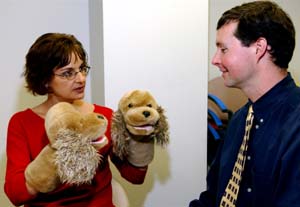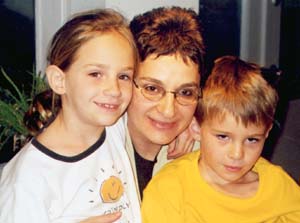Unlike many who become physicians, Joan L. Luby, M.D., was not particularly drawn to math and science. She was more interested in the liberal arts.
At Brown University, her major was something she designed called “Poetry and Science,” but in spite of her attraction to art, she always knew she wanted to be a psychiatrist.

“When I went to medical school at Wayne State University, my sole purpose was to become a psychiatrist,” says Luby, assistant professor of child psychiatry, founder and director of the School of Medicine’s Early Emotional Development Program, and director of residency training in child psychiatry.
“A lot of my rotations during medical school were very painful. I wasn’t exactly ‘biding my time’ because no med student ever does that — there’s way too much work to do — but I would say that I suffered through a number of rotations before I could get to the good part.”
Psychiatry had attracted her since childhood. Luby’s father, Elliot D. Luby, M.D., is a psychiatrist. A graduate of the School of Medicine, he was a forerunner in biological psychiatric research on schizophrenia.
But his biggest influence on his daughter came from the fact that he brought his work home — literally.
“He actually would see patients in our home,” she recalls. “When I was growing up, patients came to the house and went behind the door in this room with my father, and I was fascinated by what was happening in there. I think I’ve spent much of my career pursuing what was going on behind that door.”
The other thing Luby always wanted to do was to work with kids. She started baby-sitting when she was very young. During junior high, she and a friend started an informal summer campfor young children in the neighborhood.
Since she knew she wanted to be a psychiatrist and that she loved kids, child psychiatry was a natural fit.
What’s unusual about Luby isn’t that she works with kids. It’s the age of those kids. Most of her patients are 2-5 years old.
A ‘play’ doctor
After medical school, Luby was an intern at Sinai Hospital in Detroit. Ironically, after her single-minded pursuit of psychiatry, she really enjoyed internal medicine.
But psychiatry remained her first love, and in 1986, she arrived at Stanford University School of Medicine as a resident. It was there that she started working with very young children, and she began a fellowship in child psychiatry in 1988.

“Joan was fantastic,” recalls Anne Benham, M.D., clinical professor of psychiatry at Stanford and Luby’s mentor there. “Infant psychiatry is a unique and complicated field because you can’t depend on the patient to tell you exactly what’s wrong.
“But Joan was an excellent clinician and very open-minded and scholarly. She was just extraordinarily capable.”
Luby liked life at Stanford, and when her fellowship was completed she would have stayed. But her husband at that time — who also is a Washington University psychiatrist — wanted to come to St. Louis.
|
Joan L. Luby, M.D. Birthday: Feb. 20, 1969, in Detroit Education: A.B. with honors, “Poetry and Science,” Brown University, 1981; M.D., Wayne State University School of Medicine, 1985 University positions: Assistant profossor of child psychiatry; director of the Early Emotional Development Program, director of residency training in child psychiatry Family: Husband, Steven Jay Hirsch, Ph.D; children, Leah Newcomer, 11, and Adam Newcomer, 9 Interests: Politics, commuting between St. Louis and Pittsburgh (where her husband lives), the zoo, the City Museum, kids’ soccer games. And,”I love to cook, I’m constantly working on my kids to push them tin the direction of eating new things.” |
Luby agreed to the move, knowing that although there was little foundation in her area of interest, there was potential for growth. When she arrived in St. Louis, she immediately opened a new infant/preschool clinic.
That was 1990, and most of her new colleagues weren’t quite sure how psychiatry connected with infants and preschoolers.
Many developmental psychologists had even argued that very young children could not have psychiatric illnesses. Their theories purported that only when children got older and started school could attention deficit hyperactivity disorder, oppositional defiant disorder or depression even occur, let alone be diagnosed.
But over the years, Luby’s research has managed to contradict many of those developmental “facts.”
In addition, parents, doctors and day-care providers are increasingly more aware of the early signs of psychiatric illness in very young children.
“Children are in structured, preschool-like settings earlier and earlier,” Luby says. “A lot of our referrals to the infant/preschool clinic are kids who have been kicked out of their preschool or their daycare at the age of 2 or 3.”
She says that when a very young child develops a psychiatric disorder, it does more than affect his or her mood. Because children face so many developmental hurdles between birth and age 5, psychiatric disorders can impair children’s normal patterns of development.
“The brain is undergoing rapid change early in life,” Luby says. “And there is a steep developmental trajectory that goes along with it, which is one of the reasons it’s incredibly important to diagnose and treat these disorders early on.”
Ah, but there’s the tricky part. Diagnosing depression in a 3-year-old is a lot different than in an adult or even an older child.
One technique that Luby has used is a “puppet interview.” Children are asked about their feelings by observing two puppets talking with one another. The puppets discuss how they feel, and the children need only to point to the puppet that best expresses their own emotions.
That’s one example of how diagnosing and treating psychiatric illness in a 3-year-old is a bit different. Usually, it involves both clinical skill and play.
“I tell the trainees that you can’t be an infant psychiatrist if you don’t know how to play,” Luby says. “That’s really a prerequisite for the job. Part of it involves being a professional playmate.”
But that doesn’t mean it’s not serious work. Luby has published groundbreaking research about depression in preschoolers. Using the puppet interview and other tools, her team has learned that it is possible to demonstrate that very young children can become clinically depressed.
And unlike some research that has suggested that secondary or “masked” symptoms — such as physical pain like a stomachache — can signal psychiatric problems, Luby has shown that depressed kids can be diagnosed primarily because they don’t seem to enjoy activities and play as much as typical toddlers.
“In part because of difficulties in studying infants and young children, this area of psychiatry has been slow to develop,” says Charles F. Zorumski, M.D., the Samuel B. Guze Professor and chair of the Department of Psychiatry. “But it has become increasingly clear that events that occur very early in life have a significant impact on subsequent development of both childhood and adult-onset psychiatric disorders. Joan is doing truly significant work in this field.”
Doctor Mom
Luckily for someone working with preschoolers, 3 is Luby’s favorite age. Her own children are a bit older than that now, so she has the good fortune to watch them grow into adolescence while continuing to play with 3-year-olds on a regular basis.
She says psychiatrist/mothers face the same parenting challenges as everyone else, and although she isn’t sure whether her training as a child psychiatrist helps her parenting skills, she hopes it does.
“When I’m in the role of mother, I’m just like any other mother,” she says. “But on the other hand, I think if you asked my kids, they might tell you that a bit of the child psychiatrist can sometimes spill over into home life.”
And it is a complicated home life these days.
It’s not only running kids to activities and events or trying (and mostly failing) to get them to eat new recipes she’s picked up as part of her cooking avocation. There’s also the fact that Luby’s husband, Steven Jay Hirsch, Ph.D., teaches and researches Latin-American history at the University of Pittsburgh.
That means he must commute between Pittsburgh and St. Louis on weekends. Or sometimes, Luby and the kids make the trip to Pennsylvania.
But if nothing else, their relationship proves the importance of childhood influences later in life. Before they were re-acquainted as adults, Hirsch was Luby’s boyfriend in sixth grade.
With a twinkle in her eye, Luby describes their reunion as adults with a nod to the importance of childhood.
“I am living proof that those early developmental experiences are absolutely formative,” she says.